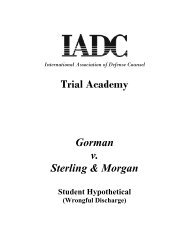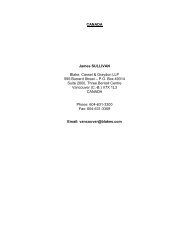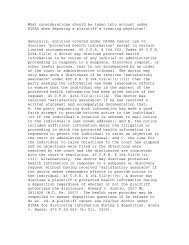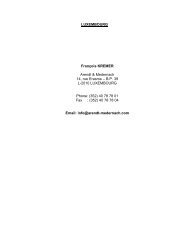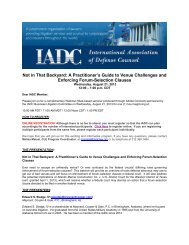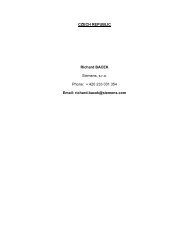Defense Counsel Journal - International Association of Defense ...
Defense Counsel Journal - International Association of Defense ...
Defense Counsel Journal - International Association of Defense ...
Create successful ePaper yourself
Turn your PDF publications into a flip-book with our unique Google optimized e-Paper software.
Court-Imposed Time Limits on Trial Page 395expert testimony in the setting <strong>of</strong>a time-limited trial.Time limits mo tivate judges tocontrol evasive adve rsewitnesses. In our experience,judges presiding over timerestrictedtrials are particularlyreceptive to control an evasiveand nonresponsive witness.Even where a judge is notproactive in controlling thewitness, the cross-examinershould remind long-winded orfilibustering witnesses about theneed to be responsive given thetime limits in the case. If theevasiveness continues, counselshould ask the court to instructthe witness accordingly. Again,judges appear to be particularlyreceptive to this request in atime-limited trial. This approachmay well create the impressionthat, unlike the plaintiff’switness, the defense is mindful<strong>of</strong> and respects the jury’s andjudge’s time.Time limits provide clients withsome logistical and budgetcertainty. Clients and clientrepresentatives appreciatepredictability in an otherwiseunpredictable trial environment.A time-limited trial gives inhousecounsel a betteropportunity to plan andcoordinate with the company’strial witnesses. It also helpsoutside counsel to coordinate theschedules <strong>of</strong> expert witnesses, asopposed to having to keep themon “standby” for several weeksat a time. Even though it isobviously impossible to predict averdict with certainty, a shorter,time-limited trial can at leastprovide the client with the abilityto budget for the cost <strong>of</strong> tryingthe case itself.Notwithstanding the benefitsdescribed above, time limits during trialcan be detrimental to defendants incertain circumstances, particularly wherethe limits are unfair or not properlyenforced by the court.Inadequate total time li mitsand/or allocation can prejudicedefendants. Time constraintsduring trial have the potential toprejudice defendants if theoverall time is too short or if thetime is unfairly allocated amongthe parties. With respect to theallocation, the unfairness mayarise in a single defendant case(e.g., 75% to plaintiff and 25%to defendant) or in a multidefendantcase (e.g., 50% toplaintiff and 50% to be splitamong defendants). To preventthis, the parties should makeevery effort to present a realisticexpectation <strong>of</strong> the time needed topresent their case, and the courtshould take into account thefactual complexity <strong>of</strong> the caseand such factors as the number<strong>of</strong> parties, legal claims, andwitnesses per party. Fairlyallocating time is even moredifficult in cases involvingmultiple defendants, particularly



